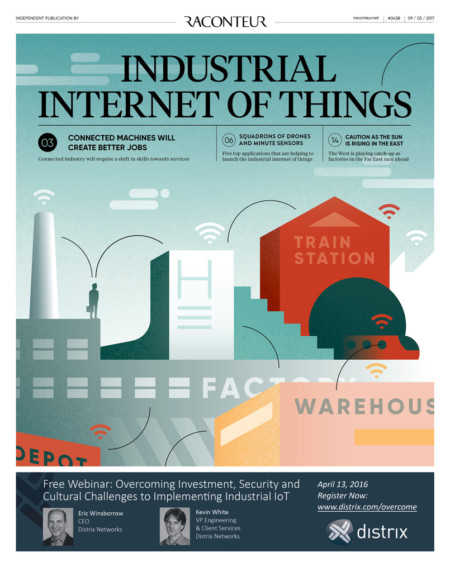Robert Wachter
See the following -
AMA CEO Calls Digital Products Modern-Day ‘Snake Oil’
When it comes to electronic health record technology, the American Medical Association has been an outspoken critic about what it perceives as the shortcomings of EHRs, voicing the widespread dissatisfaction of the doctors who use the systems. However, the nation’s largest physician group is now taking aim at new and emerging health IT technologies—such as mobile healthcare apps—that it believes are leading to practice disruption...
- Login to post comments
Connected Tech Is Just the Thing for the NHS
 Healthcare systems all over the world are struggling with two fundamental concerns – how to afford the rising cost of delivering care and how to integrate ever-changing new technologies? These twin challenges are intrinsically connected, for emerging technologies offer the promise of making care more affordable as well as more effective. The rewards for successful implementation will be significant, for patients as well as for those responsible for the sustainability of healthcare systems. In healthcare, the internet of things (IoT) is changing the way we think about looking after people. At the heart of this technological revolution is a focus on connectivity. Drug discovery and greater understanding of disease are critical.
Healthcare systems all over the world are struggling with two fundamental concerns – how to afford the rising cost of delivering care and how to integrate ever-changing new technologies? These twin challenges are intrinsically connected, for emerging technologies offer the promise of making care more affordable as well as more effective. The rewards for successful implementation will be significant, for patients as well as for those responsible for the sustainability of healthcare systems. In healthcare, the internet of things (IoT) is changing the way we think about looking after people. At the heart of this technological revolution is a focus on connectivity. Drug discovery and greater understanding of disease are critical.
- Login to post comments
Doctors Demand Extreme EHR Makeover ... Right Now
 Just about every week or so there’s a new report chronicling doctors’ frustrations with electronic health records. Drill down a bit and the source of discontent becomes clear: poor usability, clunky interfaces, ineffective search and too many clicks. So what would actually make doctors like their EHR? “They need a tremendous makeover with lots of clinical input to make it easy to do not only the right thing, but the things you do all the time,” said Robert Wachter, MD, a professor of medicine at the University of California, San Francisco.
Just about every week or so there’s a new report chronicling doctors’ frustrations with electronic health records. Drill down a bit and the source of discontent becomes clear: poor usability, clunky interfaces, ineffective search and too many clicks. So what would actually make doctors like their EHR? “They need a tremendous makeover with lots of clinical input to make it easy to do not only the right thing, but the things you do all the time,” said Robert Wachter, MD, a professor of medicine at the University of California, San Francisco.
- Login to post comments
Electronic Health Records: a “Quadruple Win,” a “Quadruple Failure,” or Simply Time for a Reboot?
 Just a decade ago, when paper charts were commonplace in the USA, it seemed that electronic health records (EHRs) were destined to transform the quality and efficiency of healthcare delivery, as well as the care experience for patients and clinicians...The reality over the ensuring years has, to put it mildly, not met expectations. According to a 2014 analysis led by the Office of the National Coordinator for Health Information,2 over 80% of US doctors now use EHRs. Yet, many of the predictions about the benefits of EHRs have yet to materialize to the extent predicted. ..Noteworthy concerns include egregious medical errors resulting from design glitches3, charting templates filled extensively with meaningless boilerplate, the common practice of pasting old notes4 that makes it difficult to know which documentation is “real,” “alert fatigue”5 due to excessive EHR warnings, and even reduced communication among clinical team members.6
Just a decade ago, when paper charts were commonplace in the USA, it seemed that electronic health records (EHRs) were destined to transform the quality and efficiency of healthcare delivery, as well as the care experience for patients and clinicians...The reality over the ensuring years has, to put it mildly, not met expectations. According to a 2014 analysis led by the Office of the National Coordinator for Health Information,2 over 80% of US doctors now use EHRs. Yet, many of the predictions about the benefits of EHRs have yet to materialize to the extent predicted. ..Noteworthy concerns include egregious medical errors resulting from design glitches3, charting templates filled extensively with meaningless boilerplate, the common practice of pasting old notes4 that makes it difficult to know which documentation is “real,” “alert fatigue”5 due to excessive EHR warnings, and even reduced communication among clinical team members.6
- Login to post comments
Hazards Tied to Medical Records Rush
Subsidies given for computerizing, but no reporting required when errors cause harm
- Login to post comments
openEHR 2020 - International Community Event
Hosted by Digital Health and taking place on 24 November, 9am - 5pm (GMT), join us to discover the latest developments, insights and best practice openEHR case studies from a variety of international digital health leaders, including renowned speakers such as Robert Wachter, MD, University of California, San Francisco Department of Medicine Chair and author of The Digital Doctor: Hope, Hype, and Harm at the Dawn of Medicine's Computer Age book, Mike Jones, VP, Gartner Group, CIO Advisory Healthcare, Aloha McBride, EY Global Health Leader, and many more. Read More »
- Login to post comments